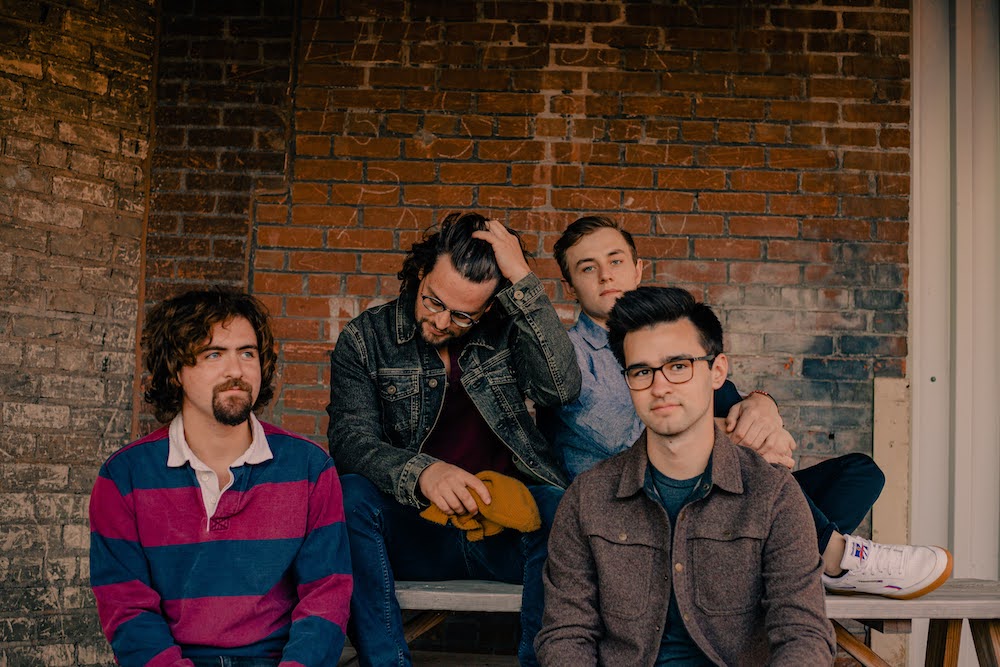|
The Dead Century, Flip Rushmore, Lucid VanGuard, and Zippo Man are playing the Turf Club in St. Paul, Minnesota, on Thursday, May 18. Ticket information is here.
Nick Check and Rob Muehlbauer of the Dead Century got on the phone with Alex of Flip Rushmore to discuss their new album, The Well, and less-than-friendly concertgoers. ---
Alex: I was promised a story about a machete.
Nick: This happened a long while ago. We were in California at the time. We had just started playing live in earnest. We were playing wherever we could. Peoples' garages. House parties. Farmers markets. Anywhere in between. So we found a bar, which I'll leave unnamed. But it was a bar in La Mesa, California, which would have us play now and again. It was a really small place, and it filled up quick, but it was always a bit of a sketchy venue. People were always walking in and out, probably moving drugs out back. One night, the bartender, Irish Mike, he was acting really cagey. Really nervous. We knew something wasn't quite right. He was talking to the other bartender, Allison. Our spot came on. We went up to play, but we were keeping an eye on them the whole time. They were getting cagier and cagier. Alex: Was there a look in their eye, or something? Nick: They were fidgety. They were on the phone a lot. Checking the windows, pulling the shade back. Checking the back door. I didn't know if the feds were gonna roll up. Some dude with a machete walks in the back. He's got scars on his face, and he's got one arm. I don't know if he was born that way, or if he lost a fight to another dude with a machete who was faster on the draw. He walks to the front, the stage area. My brother, John Paul [Check], plays bass and likes to wander around. He ends up face to face with this guy as he walks in. John jumped the farthest I've ever seen in his life to get out of this guy's way. Irish Mike pulls a knife out from under the bar. Allison pulls a knife out from under the bar. We started vamping on a song. We just got quiet and ran through the chords. I was trying to find a segue to "Peace, Love, and Understanding." Irish Mike wound up taking the guy out to the front of the bar, by the busiest road. I think he wanted the traffic to be able to see whatever was going to happen. He went out with a big stack of cash, and machete guy and Irish Mike sorted it out. I wish I could've been part of that conversation. Alex: That was a rare moment to be able to soundtrack. Nick: It's true. I don't know if Tarantino could've done it better. Alex: So, you were in La Mesa, living there? From there? Nick: Yeah, it's a neighborhood in San Diego. My folks live out there, and JP went to high school out there. We've bounced around a little bit. At the time we were a three-piece outfit at that point. I played guitar. JP played bass. And we had a drummer, also named Nick. When JP finished school, we set up shop in St. Paul. Alex: Had you guys lived in Minnesota previously? Nick: We both went to school here. I've been here long enough where it feels like home in a real sense, but I definitely am a transplant. Alex: So how did you find Austin [Peterson] and Rob and put together the full band? Nick: Austin and John Paul knew each other awhile ago when we lived in Rockford, Illinois. ... At one point, we had a show on the calendar, but we didn't have a drummer. We were thinking about Craigslist. Facebook or something. Right as we were in despair, we ran into Rob [while wandering around the St. Thomas music facility]. Rob is standing there, and he's holding a snare drum. John Paul goes, "Hey, do you play drums?" And Rob looks down at the drum, like, that's the dumbest question of all time, of course I do. JP says, "Do you want to be part of a band?" and Rob said, "Yeah." And that was the interview process. We were pretty desperate. Rob: [Flip Rushmore guitar player] Mike was in the jazz band with me at St. Thomas. We both played drums. And this was after a jazz-band show on a Friday night. I was loading drums back into the auditorium where (the Dead Century) was practicing. Alex: So it could've been Mike. Rob: It could've been Mike. Alex: So Rob, you're in a "brother band." I've been there before. It's a classic predicament to find yourself in. What are the dynamics like? Rob: Yeah, umm... Nick: Do you want me to leave the room for this part? [laughs] Rob: They are good at communicating with each other. Nick does a lot of the hard work when it comes to songwriting. He'll come up with ideas, maybe a chord progression, some lyrics, and then we'll all sit together and flesh out the full band arrangements. Nick: There's a certain kind of honesty that exists in the band that I found deeply refreshing. If someone's screwing up a part, or if they're playing something that won't work, there's not that fear that you're going to hurt the other person's feelings. There's that trust at the bottom of it. This is the least Minnesotan thing ever to say, but there's a certain freedom in being to tell someone exactly what you mean, without being afraid that they'll take it the wrong way. Alex: It's tricky for any band, but especially in Minnesota where, I guess, passive aggression is the norm. It's not very productive when trying to get constructive criticism. So, you guys put out an album last year, The Well, after forming in the "pre-COVID" era. What was the process like for you guys? Because with COVID and long distance, some of our "new" songs last year had taken like 3 or 4 years to finally release. Nick: It took longer than we thought it would. I typically come to the band with a demo of some kind. Music and lyrics. But in a rough form. Maybe there's a lead riff or bass part worked out. And then the rest of the band just runs with it. One of the joys of working with other musicians is they have their own taste and their own own approach to music. They'll hear a chord progression without any kind of lead lines or phrasing or anything over it. And they'll think of something that you would've never come up with in a million years. I love watching this rough idea get burnished into something I never could've come up. This complex and beautiful arrangement. That sort of intensely collaborative effort ends up taking time. Alex: You've had a little space since putting out that album. Some time has gone by. This is a bit like a parent choosing a favorite child, but what's the song that you love the most from this record? Rob: Our song "Enough to Get You Killed." I like it because it's accessible. It's a gritty blues-rock song, and I like our songs that fit that bill. It's up-tempo. Nothing too prim and proper, just gritty. That's a fun vibe, writing songs like that. Nick. It's a blast to play. I don't do a good job writing songs about myself. Obviously ideas don't come from thin air. I'm sure there's a lot of myself in everything I write. But the one exception in all of the songs I've ever written, is "Exit on an Interstate," which was inspired directly by an experience my brother and I had driving through our old hometown in Illinois. We had moved away. A lot of our friends had moved away. We didn't have any family there anymore. So it was that very bizarre experience of going to your hometown and realizing, you've changed, but your hometown has changed, too, and you don't recognize it anymore. It's a surreal moment. That song means a lot to me.
0 Comments
|
Archives
February 2024
Categories
All
|


 RSS Feed
RSS Feed